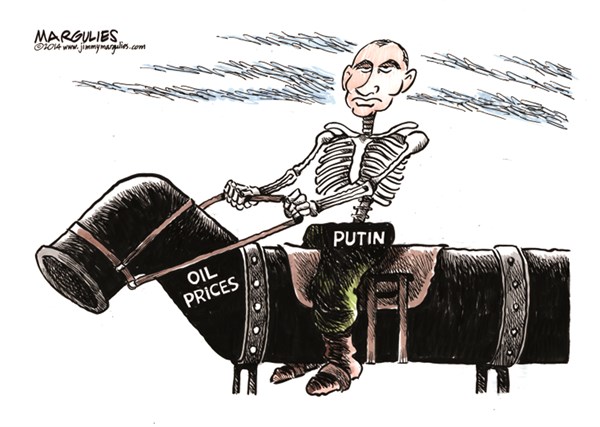Andrey Ostroukh and Andrey Ostroukh write: Russia’s government is considering swingeing budget cuts and the sale of stakes in state companies as it grapples with a plunge in the price for crude oil, its main export, that the prime minister said could cause “prolonged stagnation.”
Russian Economy Minister Alexei Ulyukayev said Wednesday that Russia would have to adjust to a “new normal” of low prices for crude, which will last for a “very lengthy” period. Finance Minister Anton Siluanov said the government would propose a 10% cut to spending from a budget that was based on an oil price of $50 a barrel, nearly $20 higher than the current level.
“We need to prepare for the worst scenario,” Prime Minister Dmitry Medvedev said in a speech at an economic conference in Moscow Wednesday. “We need to live according to our means, including by reducing budget expenditures, decreasing spending on the state apparatus, the privatization of part of state assets.”
The suggestion of potential state-asset sales—often touted in recent years, but hardly ever executed—shows how wide Russian officials are casting the net for ways to shore up a federal budget that receives half its revenue from the oil and gas sector. High oil prices had been the cornerstone of President Vladimir Putin’s 15-year rule, allowing him to boost social spending and raise living standards. But the fall in the oil price and sanctions over the Kremlin’s interventions in Ukraine brought about a 3.7% economic contraction last year, accompanied by a slide in real incomes. Officials say the economy will grow this year, but the World Bank forecasts a 0.7% contraction.
“Many became poorer; the middle class suffered. That’s the most painful consequence of last year’s economic blows,” said Mr. Medvedev.
Still, there appear few threats to Mr. Putin’s rule. His approval rating has risen above 80% in the last two years, pollsters say, since Russia seized Crimea and has presented itself as being under siege from the West.
Mr. Putin has said repeatedly that Russia’s economic slide has bottomed out, but late last year he indicated that budget cuts could be necessary. Mr. Siluanov said spending reductions could be as high as 10%, or 500 billion rubles ($6.5 billion), to meet Mr. Putin’s demand that the budget deficit be kept under 3% of gross domestic product. Mr. Siluanov, whose ministry has long pushed for tighter spending, said the government shouldn’t rapidly increase borrowing.
Mr. Ulyukayev, the economy minister, said Wednesday that the government could sell stakes in the two largest state banks, Sberbank and VTB, in part to inject funds into them. The Russian banking system needs new funds, he said, as Western financial markets have remained closed to them due to sanctions.
Russian officials have in recent years repeatedly floated the idea of selling stakes in state giants such as oil producer OAO Rosneft, but the plans were never realized as officials said they shouldn’t be sold on the cheap.
Mr. Medevedev described Russia’s economic situation as “difficult, but manageable.” He warned that a return to growth wasn’t assured and that the government needed to act to stimulate investment and head off an “economic depression (that) could last for decades.”
The slide of the oil price to $30 has hammered the Russian ruble, sending it to its lowest-ever closing level of 77 to the dollar Tuesday. The weakening currency spurred an increase in consumer prices of 12.9% last year, and analysts say further weakness limits the room for the central bank to cut interest rates to help drag the economy out of recession. The ruble recovered almost 1% Wednesday as the crude price edged upward.
Former Finance Minister Alexei Kudrin, a confidant of Mr. Putin, said Wednesday that Russia should raise the retirement age, something that the Kremlin has previously ruled out, and that the economy needed to grow by around 5% a year before social spending could be increased. Mr. Kudrin, a favorite of Western investors for his commitment to fiscal discipline and market reforms, was in talks late last year with senior officials on a possible return to a top government post, but such a move isn’t imminent, according to a person familiar with the matter. A spokesman for Mr. Kudrin confirmed he had met with Mr. Medvedev at the end of last year to discuss economic issues, and said the former minister hadn’t been offered a government post.

